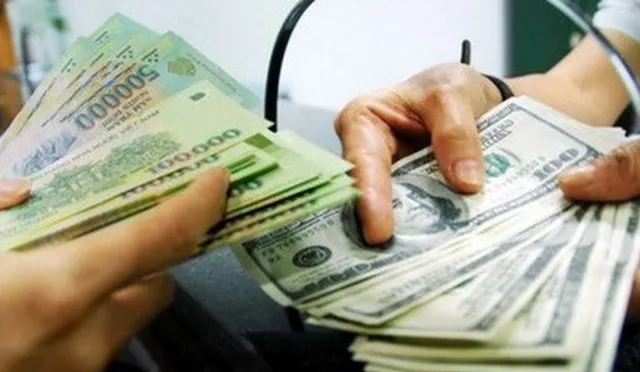
Finance at the Academy of Finance, shared his expert insights on the State Bank of Vietnam’s (SBV) decision to maintain the 0% interest rate cap on USD deposits. While acknowledging the short-term challenges in exchange rate management, Dr. Do emphasized the medium-term stability benefits of this policy.
Interviewer: - Dr. Độ, after nine years of implementing the 0% interest policy on USD deposits, many have proposed to the SBV to raise this cap. However, in the recent meeting on July 17, the SBV decided not to change this policy. What do you think is the main reason for their hesitation?
Dr. Nguyễn Đức Độ: - If the SBV were to raise the USD deposit interest cap, it would provide more opportunities for forex mobilization and lending activities. Businesses could access credit at more attractive rates compared to VND loans. However, this would likely lead to increased hoarding of USD among individuals and businesses, making it more challenging to reduce VND deposit and lending rates.
Conversely, by maintaining the 0% USD deposit rate while ensuring the stability of the VND/USD exchange rate, those holding USD will be discouraged. The amount of USD in the economy will gradually decrease, which is already happening. As a result, individuals and businesses will shift to holding VND, often for longer terms, thereby facilitating a reduction in VND deposit and lending rates. When VND lending rates fall to reasonable levels, VND credit will increase, and the demand for forex loans will decrease accordingly.
- Some argue that the 0% USD deposit interest policy causes foreign currency outflow, especially when the Fed raises interest rates. What is your view on this?
- The 0% USD deposit interest rate policy primarily addresses the hoarding of foreign currency and the inflow into commercial banks. The amount of money banks send abroad likely depends on outflow factors. Suppose the USD deposit interest rate increases and more foreign currency flows into banks. If for some reason banks cannot increase forex lending or sell the foreign currency for VND, the amount of money sent abroad might increase rather than decrease.
- Does this mean the SBV has little reason to increase the USD deposit interest rate in the near future?
- I agree with this view. The SBV's long-term goal is to discourage foreign currency hoarding through stable exchange rates and a 0% USD interest rate. This policy also aims to eliminate the ongoing "dollarization." Although it takes time for this policy to be effective, the SBV is unlikely to introduce measures that would exacerbate "dollarization."
Looking back a decade, there was a significant amount of USD hoarded by individuals and businesses, which was wasteful as it could not be used for production and business activities. At that time, the SBV aimed to circulate the existing USD in the economy rather than increase the amount held by individuals and businesses. Hence, the SBV allowed limited forex credit activities to utilize the existing USD while discouraging further hoarding by maintaining the 0% foreign currency deposit interest cap.
There is a trade-off between short-term benefits and medium to long-term advantages. The SBV aims to implement a flexible short-term policy while maintaining long-term consistency to combat "dollarization." Ultimately, when people hold less USD and more VND, it will facilitate lower VND deposit and lending rates. Consequently, the demand for USD loans will decrease, and the SBV will revert to prohibiting forex credit activities.
Maintaining the 0% USD deposit interest rate helps curb the propensity to hold foreign currency, thereby reducing the risk of dollarization. Dollarization, where foreign currency replaces or complements the local currency in everyday transactions, can undermine monetary policy effectiveness and economic stability. By disincentivizing the holding of USD, the SBV promotes the use of VND, which enhances the central bank’s control over monetary policy and interest rates.
This policy also encourages the reallocation of idle USD into productive investments. When USD is not profitable to hold as a deposit, businesses and individuals are more likely to convert their holdings into VND, which they can then invest or spend within the local economy. This increases the money supply in VND and supports economic growth by funding new projects, expanding businesses, and stimulating consumer spending.
Moreover, with less USD hoarding, the banking system becomes more stable. Banks holding large amounts of USD deposits might face liquidity issues if there is a sudden withdrawal or a need to convert these funds into VND for lending purposes. By reducing the volume of USD deposits, banks can better manage their liquidity and reduce the risks associated with foreign currency fluctuations.
- Thank you for your comprehensive insights.




















